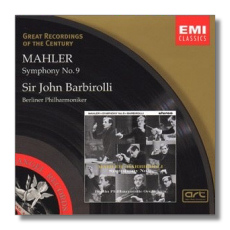
The Internet's Premier Classical Music Source
Related Links
- Mahler Reviews
- Latest Reviews
- More Reviews
-
By Composer
-
Collections
DVD & Blu-ray
Books
Concert Reviews
Articles/Interviews
Software
Audio
Search Amazon
Recommended Links
Site News
 CD Review
CD Review
How does a symphony, or any piece of music, mean? What it means is only one part of that matrix because the meaning of anything is the result of the feedback between and among the facets. I say this because when asserting that a recording is "great" (let alone GROC) you must consider the parts but also realize that the gestalt is greater than the sum of the parts.
I'll cut to the quick and assert that this recording of Mahler's 9th is one of the great ones. With who is it comparable is not a meaningful question because in the last analysis any great recording rises above comparison. There are, rather, other facets that need to be looked at. While I may consider Zander's recent recording, or Walter's stereo one on Sony, to be great this is not the same because the context is not important.
"since feeling is first" as ee cummings put it, that is where to start. In his interview with Dan Rather Stokowski said, "Emotion, life, or lifeless." Barbirolli's interpretation conveys the emotions of the human experience. There is angst, despair, frivolity, surrealism, acceptance and peace. As I sit and listen to the recording Barbirolli and the Berlin Philharmonic transport me, like it should, to another level of existence. Like a good novel it takes me from the mundane to the sublime. It begins with the feelings that open the symphony, grabbing you from the first moment.
Yes, and time is important, too. To understand the symphony means not just to hear it with today's ears. If you know the context in which and from which it was born, not only biographically, historically and socially but also artistically, then you have another facet of its "meaning" to help appreciate the gestalt. While it is born of a time and place the music should transcend its time, like any great music, it must also transcend it. It must provide the listener with the totality of time, a continuum from the past to the present and to the future. As I listen to Barbirolli and the Berlin Philharmonic Orchestra making music I also feel them taking me from the world of 1910 to the world of 1964 and then to my time and the time of my children and grandchildren. This is evident in the way Barbirolli brings together all four movements in an organic whole.
Okay, sound is also important. There are many great performances of this music, like Bruno Walter's in 1938 with the Vienna Philharmonic, that are limited by the sound. While the original CD incarnation of the Barbirolli (on EMI 63115) was good this one is smoother, richer, fuller and does not tire the ear. More important, I can now hear and appreciate individual instruments as the parts relate to the whole. This is true of so many places that specific references mean little, but I found myself saying "yes" as I heard them. The Berlin Philharmonic was a great orchestra and Barbirolli knew it well (see the notes on this matter) and brought out the parts of the fabric. As a whole, however, listen to just the opening of the symphony, its deep and haunting chords as part of the fabric, and if you are not moved by its emotion you must be made of stone.
What is the symphony about? It is about the human condition. It is about self-awareness; the knowledge that we are born to die and that knowledge is surreal because there is nothing we can do about it. It is not just existential, however, because, like the symphonies of Shostakovich, it moves from the self to all of humanity. Ask not for whom the bell tolls.
These are but a few of the facets of this great symphony. Near great recordings include Bernstein. He evokes the existential qualities but does not transcend them. Other performances do not capture the totality of the emotions in the music. They skate over the surface and may be beautifully recorded but that is not enough. Lopez-Cobos's is one of the most beautifully recorded on record, but it bores me and this is not boring music, as Barbirolli makes clear.
The Barbirolli is emotional. "Emotion, life, or lifeless." This is one of the great recordings of the century.
Copyright © 2002, Robert Stumpf II



















